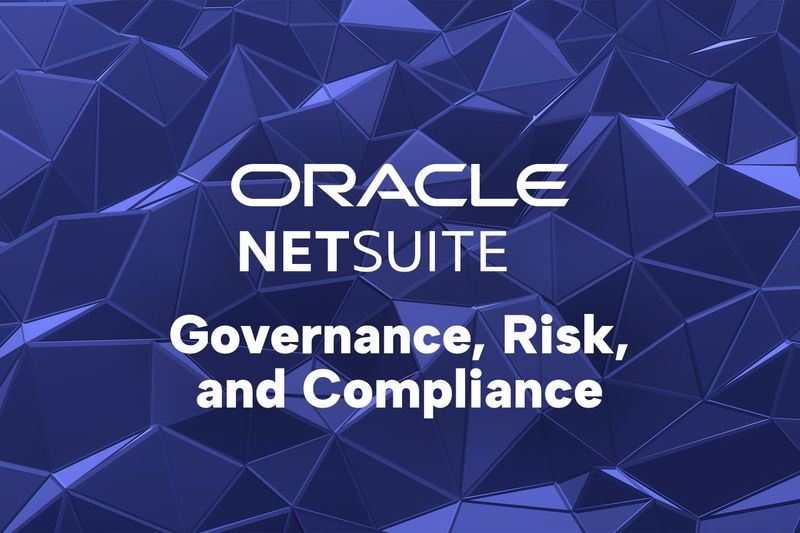Managing and complying with complex regulatory requirements is time-consuming and resource intensive. Ever-changing rules, shifting global policies, and data security are just a few of the topical challenges businesses face now, more than ever.
NetSuite’s Governance, Risk, and Compliance (GRC) is a purpose-built solution designed to tackle the ever-evolving complexities of regulatory, operational, and compliance challenges.
Combined with the power of its ERP platform, NetSuite offers effortless and robust customization, automation, and reporting features tailored to meet your company’s requirements and relieve the pressure of persistent auditing.
Defining Governance, Risk, and Compliance

Governance, Risk, and Compliance (GRC) is a strategic framework that organizations use to manage and align their business practices with various objectives, government regulations, and ethical standards. It encompasses three key components:
1. Governance
Governance refers to the system of rules, processes, and practices by which an organization is directed and controlled.
It involves defining the roles and responsibilities of key stakeholders, setting strategic objectives, and establishing the policies and procedures that guide decision-making and operations throughout the organization.
Effective governance ensures that the company’s activities are aligned with its mission, values, and long-term goals.
2. Risk Management
Risk management involves identifying, assessing, and mitigating potential threats and uncertainties that could impact the organization’s ability to achieve its objectives and key results.
This includes financial, operational, compliance, and reputational risks. Businesses use risk management practices to minimize negative outcomes and capitalize on opportunities while making informed and well-balanced decisions.
3. Compliance
Compliance is the adherence to laws, regulations, industry standards, and internal policies that apply to an organization’s operations. It ensures that companies operate within the legal and ethical boundaries set by regulatory authorities and industry best practices.
Compliance efforts include monitoring, reporting, and implementing controls to prevent violations and maintain ethical conduct.
Why is Governance, Risk, and Compliance Important?

GRC creates a cohesive and structured approach to managing an organization’s operations, risk exposure, and compliance obligations.
It helps companies proactively identify potential risks, maintain transparency and accountability, and demonstrate good corporate citizenship to stakeholders, including investors, customers, employees, and regulatory bodies.
Implementing effective GRC practices is crucial for sustainable business growth, maintaining trust and reputation, and preventing costly legal or financial consequences from non-compliance or inadequate risk management.
What Are the Challenges of Governance, Risk, and Compliance?

GRC poses several challenges for organizations across various industries, including:
- Complexity of regulations: Companies must comply with a multitude of ever-changing local, regional, and global regulations. Understanding and interpreting these complex rules can be challenging, especially for multinational corporations operating in different jurisdictions.
- Keeping up with regulatory changes: Staying abreast of the constant regulation updates and amendments is a significant challenge. Failure to comply with the latest requirements can lead to penalties, fines, and reputational damage.
- Data privacy and security: GRC efforts require handling sensitive data, and protecting this information from unauthorized access or breaches is crucial. Striking a balance between data accessibility and security is a constant challenge.
- Lack of visibility and coordination: Large organizations with multiple departments often need help maintaining centralized oversight and coordination of their GRC efforts. Siloed approaches can lead to inefficiencies and gaps in compliance.
- Resource constraints: Implementing effective GRC programs requires dedicated resources, including personnel, technology, and financial investments.
- Cultural and organizational challenges: Building a culture of compliance and risk-awareness throughout the organization can be difficult. Resistance to change or lack of commitment from employees and management can hinder successful GRC implementation.
- Vendor and third-party risk: Companies often collaborate with external vendors and partners, exposing them to potential third-party risks. Monitoring and ensuring compliance in such relationships can be intricate.
- Integration of GRC systems: Companies might have multiple systems and tools for various GRC functions, and integrating them seamlessly can be challenging. A cohesive approach can help efficient data flow and reporting.
- Quantifying and prioritizing risks: Identifying and assessing risks across different business areas and prioritizing them for mitigation can be complex. Organizations must allocate resources based on the severity and likelihood of potential risks.
- Change management: Implementing new GRC processes and technologies may require changes to existing workflows and employee training. Ensuring smooth adoption and acceptance of these changes can be a challenge.
Addressing these challenges requires a proactive and holistic approach to GRC involving strong leadership commitment, clear communication, robust technology solutions like NetSuite, and a commitment to ongoing monitoring and improvement.
How Does NetSuite Help Businesses with Governance, Risk, and Compliance?

NetSuite’s Governance, Risk, and Compliance provides end-to-end management capabilities, real-time assessments, and automation to streamline regulatory compliance.
Let’s take a look at NetSuite’s features and benefits to see how this is done.
NetSuite Governance, Risk and Compliance Features & Benefits
NetSuite’s GRC features are thoughtfully built to ease the burden of regulatory compliance.
Say goodbye to expensive, ineffective, and last-minute compliance efforts. With NetSuite, you get a built-in, reliable GRC process that looks ahead and takes action to manage risks before they become risk compliance concerns.
Powerful Automation: Do More with Less Effort
Automation is at the heart of NetSuite’s core power. Process and deliver reporting across your entire organization with fewer clicks. NetSuite signature tools like workflows, SuiteScripts, saved searches, and custom fields empower you to avoid repetitive work and sidestep manual errors or oversight.
Moreover, every part of the audit procedure can be automated and organized to fit your organization, including:
- Risk assessment
- Planning
- Inventory management
- Time and expense management
- Issue tracking
- Reporting and remediation
Real-Time Assessment
Rest easy knowing that your environment is set up to meet regulatory compliance standards. With real-time compliance assessments, NetSuite promptly notifies you of problematic security policy changes and provides action steps for improvement.
Security with Audit Insights & Trails

CFOs and financial managers get complete control, visibility of changes, and insight into potential risks by harnessing features like role-based security, user authentication, and access management.
Plus, NetSuite protects your data with unmatched protection against outside attacks. Any attempts are recorded and investigated to help you prevent future threats. Secure your master database with the following features:
- Custom roles, permissions, and restrictions
- Multifactor authentication
- IP-address rules and blocking
- Groups and audiences
- Custom scripts
- Company-specific workflows
- Field-level security measures
Audit trails and protection measures enable finance leaders and auditors to swiftly investigate any activity affecting data security, rules, or financial documents.
Generate Reports & Certificates
NetSuite comes with various reports and certificates, such as SOC 1, SOC 2, ISO 27001, ISO 27018, PCI-DSS, PA-DSS, EU Cloud CoC, and others. Your reports deliver precise financial data while providing the documentation you need to meet your risk and compliance needs.
Global Audit & Compliance Reports
Electronic audits have become the norm in numerous countries, conducted by both external auditors and government tax authorities.
NetSuite offers extensive support for various audit file formats like SAF-T (used in all OECD countries), GDPdU (for Germany), IAF (for Singapore), and more.
With NetSuite, you benefit from an ever-present audit trail, integrated analytics, access logs, and tight workflow management. You drill down into reports, accessing underlying transaction details, so you have complete visibility and transparency — both essential elements to sustain government requirements.
Gain Peace of Mind with NetSuite Governance, Risk, and Compliance

The bottom line: NetSuite improves your governance, risk, and compliance management by standardizing GRC processes, streamlining decision-making, and preventing unnecessary and redundant expenses.
You no longer have to act on a whim to address regulations, inspections, and audits. NetSuite’s Governance, Risk, and Compliance solution gives you a fully integrated and sustainable risk management and compliance process.
If you’d like to gain a competitive advantage in your industry, reach out to our StratusGreen industry experts for a personalized NetSuite demo. We’re equipped and passionate to help businesses thrive by tailoring NetSuite to your company’s needs and empowering your team to achieve long-term success.



